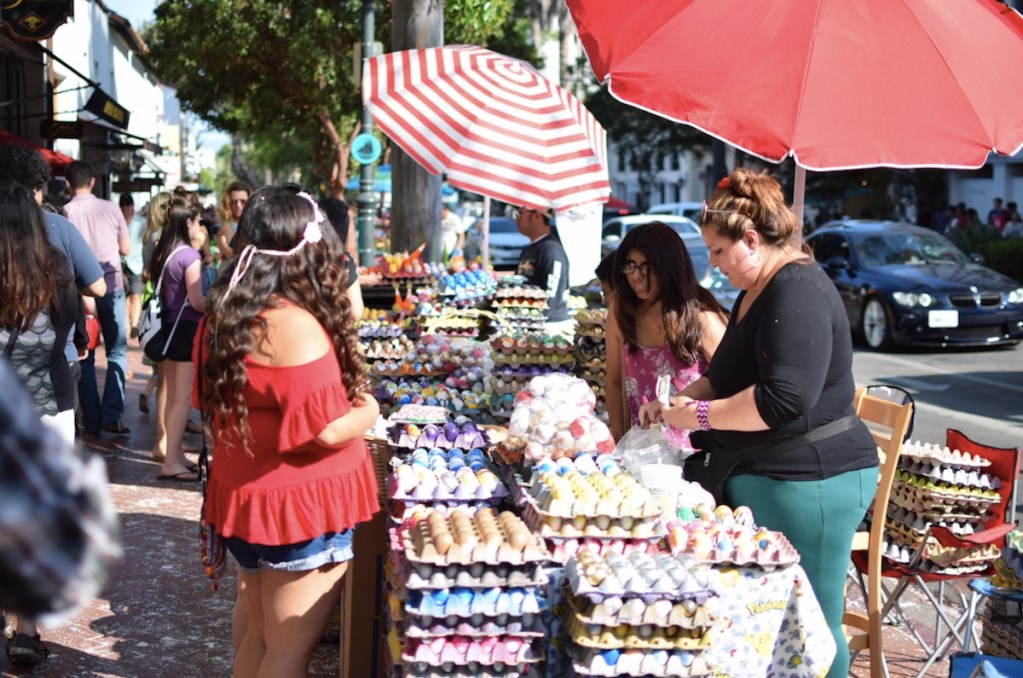Santa Barbara’s fleet of street vendors will soon be subject to a new set of rules approved Tuesday by the City Council.
Since time immemorial, commercial vending has technically not been allowed on Santa Barbara streets and sidewalks, but the municipal code was rarely, if ever, enforced. In 2019, however, the California Legislature enacted a law that legalized vending throughout the state in order to create “entrepreneurial and economic development opportunities for immigrant and low-income communities.” It also gave local governments the leeway to create their own regulations.
Santa Barbara’s new ordinance will require vendors to obtain an over-the-counter business license at a reduced fee of $25. In lieu of a Social Security number to prove identification, a driver’s license, library card, or student ID may be used. If the vendor sells food, they would also need to secure a permit from the county’s Public Health Department.
The ordinance includes a lengthy list of descriptions for how, when, and where vendors may operate with a focus on keeping sidewalks safe and passable. Some exceptions were carved out for sellers of cascarones and other items on State Street during Old Spanish Days Fiesta.
City Attorney Ariel Calonne stressed to the council that the new state law “is not meant to trick or trap vulnerable individuals.” Instead, he said, “It’s meant to welcome them into California’s business community.” By legitimizing businesses that have historically operated outside a regulatory framework, it will allow them to borrow money, expand, and take advantage of other opportunities for growth, Calonne said.
While generally supportive of the local ordinance, Councilmember Alejandra Gutierrez said she harbored some concerns that enough outreach had been provided to the vendors themselves. “I live in the neighborhood where a lot of these street vendors are,” she said. “I understand the population, and I really want to see [city] staff members out in the community doing the education piece. Not just handing out fliers and saying, ‘Figure it out.’”
Sign up for Indy Today to receive fresh news from Independent.com, in your inbox, every morning.
Gutierrez was assured by Economic Development Director Jason Harris that the city would be teaming up with bilingual business development groups to communicate the new rules to the vendors. He said a “comprehensive education campaign” would be staff’s top priority before any administrative fines (which would range from $100 to $500) were handed out.
Councilmember Meagan Harmon asked that warnings be issued before any fines are assessed and that a one-year moratorium on the penalties be enacted so that outreach efforts have sufficient time to take place. All of her colleagues agreed to the changes except for Councilmember Oscar Gutierrez, who voted against the ordinance in its entirety, explaining he felt it created unnecessary hurdles for already underserved members of the community.
Harmon admitted she wrestled with supporting the new rules. On one hand, she explained, the fundamental purpose of such a law is to “provide a pathway from informality to legality,” as letting an informal economy linger outside regulatory status “can have the effect of perpetuating and reinforcing cycles of poverty and inequality.”
On the other hand, Harmon said, making that transition is incredibly delicate work, as the government is now “taking the tools that have been used to keep workers in the shadows” and telling those workers “we’re now using those same tools to bring you in.” Successfully making the argument to vendors that regulation is actually a good thing and could give them access to credit and capital will take “a huge amount of trust and ongoing engagement,” Harmon said.
During the public comment portion of the meeting, two members of the weekly Santa Barbara Arts & Crafts Show on Cabrillo Boulevard — Tanda Jacobs and Marilyn Dannehower — complained that vendors and the lines that form around them routinely block access to their stands. “That doesn’t seem right,” Jacobs said, while Dannehower asked the council to better protect an event that “adds to the cultural living history” of Santa Barbara.
Mayor Randy Rowse empathized with the artists impacted by the “Saturday morning mothership,” a flatbed truck carrying multiple carts that fan out across the waterfront. Having the ordinance in place to license and recognize vending businesses “will get us out of the Wild West mode,” Rowse said, and “weed it down to the people who are serious about going for it and actually trying to make a living out of doing this as opposed to a free-for-all for whoever wants to come in on the weekends and try to hide out in busy places.”
Support the Santa Barbara Independent through a long-term or a single contribution.

